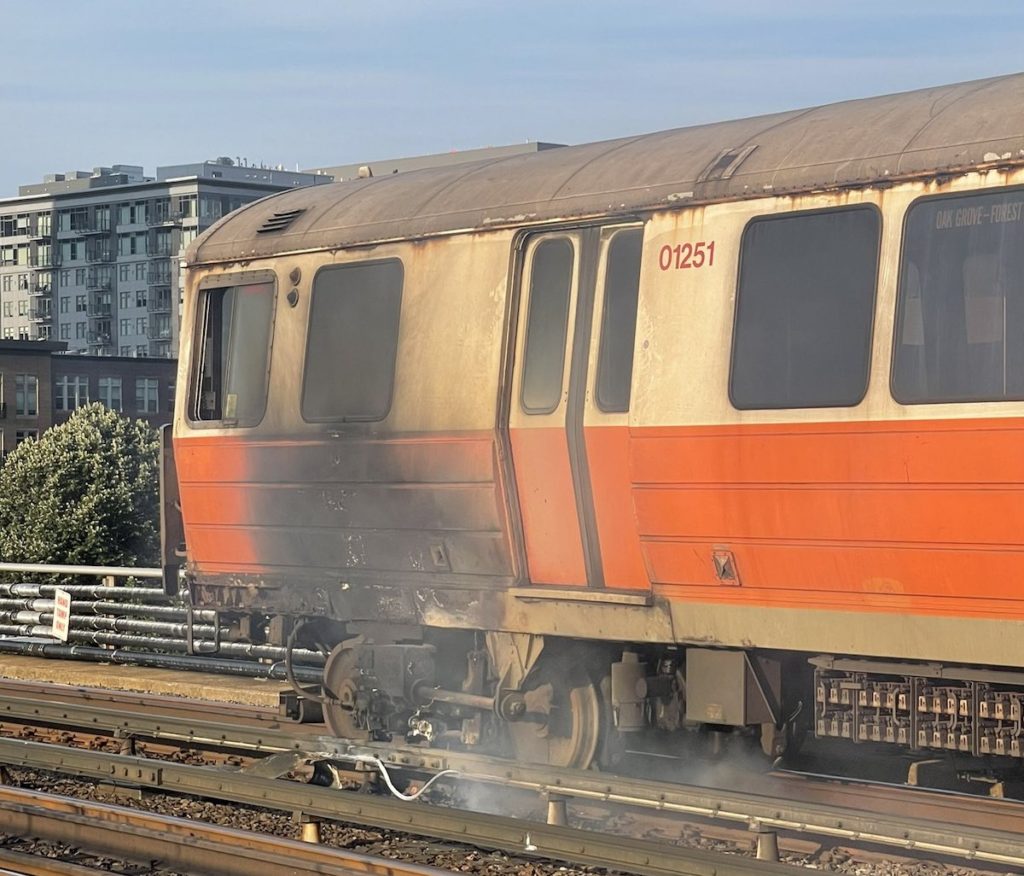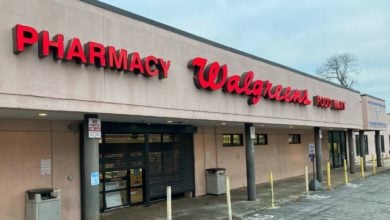A MBTA Orange Line train caught fire on a bridge over the Mystic River in Massachusetts on July 21. Terrified passengers climbed out of the train’s windows, and one woman jumped into the river to escape the flames and smoke. In April, a Red Line train door malfunctioned, trapped the arm of exiting passenger Robinson Lalin, and dragged him to his death. In September 2021, David Jones fell to his death through a rusted stairwell at the JFK/UMass station in Dorchester. Escalators are constantly out of service or malfunctioning, including a Sept 2021 incident in Back Bay station, when an escalator suddenly reversed and sent its passengers toppling backwards.
The Federal Transit Administration began a series of inspections this past April citing “derailments, train collisions, grade crossing fatalities, and incidents that have endangered both MBTA employees and its passengers” and announced that they would conduct a special safety management inspection of the agency. In June 2022, the FTA ordered the MBTA to undertake immediate safety measures, and a final FTA report on the improvements that the MBTA must act on is forthcoming in August 2022.
The following article is based on a talk given by Kimberly Barzola at a July 2019 PSL forum in Boston, discussing the state of the Greater Boston public transit system, the Massachusetts Bay Transportation Authority. We are publishing it now to give context to this series of recent horrific and deadly infrastructure failures within the MBTA.
Failures and fare hikes
Since the beginning of summer 2019 in Boston, there have been two train derailments, a bus that has caught on fire, and a power outage that forced commuters to walk out into a train tunnel. And how about the feeling of utter frustration when you arrive to a train station only to see the “20+ minutes” sign, or knowing that you just missed a bus that won’t come for another hour? To add insult to injury, on July 1, a system-wide fare hike went into effect raising the price of a one-way local subway ride to $2.40.

Photo courtesy of Twitter user @PJayG. Used with permission.
Under Massachusetts Governor Charlie Baker’s administration, measures to increase funding to our public transit system in the form of ballot referendums or bills have been outright rejected, or have been slowed or watered down. Measures like the Fair Share amendment — which outlined a mere 4% income tax increase for Boston’s wealthiest residents in order to fund public transit and education — have been met with lawsuit after lawsuit, and have been rejected by politicians in the statehouse.
In a city that holds as much wealth as Boston, how is it possible that our public transit system — a system that so many of us rely on without choice — fails us consistently, and on top of that, asks us to foot the bill? Some wish to write off these problems we face everyday as the result of just a few old trains or faulty fare machines. But these problems are the product of intentional policies and a transit system which exists under an economic system that places profits over our public good.
Has the Fiscal Management and Control Board helped?
During the winter of 2015, blizzards ushered in the new year and brought our transit system and our city to a complete halt for nearly a month. Riders were outraged by the lack of service and the extreme overcrowding on even the least used bus routes and train lines. Many demanded refunds for their useless monthly passes which run over $80.
It was then when Gov. Baker decided to create the Fiscal Management and Control Board, an appointed body tasked to take a deeper look at our transit system, identify major areas of improvement and investment and carry these changes out. Instead of taking this mandate and advocating on behalf of riders and a public transit system that we so desperately need, the FMCB has raised fares twice, continued a state-wide trend of privatization of public services, had the audacity to highlight fare evasion as a “major problem” and has contributed to deepening Boston’s racial wealth disparities.
Chronic underinvestment
Could it be that the FMCB and MBTA officials simply do not understand the scope and depth of the problems with our transit system?
No. In August of 2015, the MBTA published a landmark report known as the “State of Good Repair,” outlining how much money is necessary to invest in the MBTA to bring it up to a “State of Good Repair” — a vague metric unknown to most riders. The number that was touted and referenced in policies to come was an estimated $7.3 billion dollars. Among the issues that desperately needed upgrades were: the bus garages, the signal system — which plays the crucial role of telling train conductors when to stop and go, and train cars that haven’t been upgraded in close to 50 years.
Improvements like increasing bus service frequency or reinstating a late night train service is not possible without making these baseline investments in our transit system.
In May 2019, an independent report by the Better Bus Project reanalyzed the MBTA report findings and concluded that it wasn’t $7.3 billion that would be needed but $10.1 billion. The $10.1 billion figure is no longer just an estimate of what it will cost to bring the system into a state of “good repair,” but now refers to the cost of replacing and modernizing every currently outdated piece of equipment or infrastructure and also accounts for what some describe as “soft” expenses such as planning.
Releasing the “State of Good Repair” report means the MBTA officials who sit on the board have no excuse to not deliver on promises to improve our transit system. But instead of taking bold action to advocate on behalf of riders, the unelected board sought out false solutions by outsourcing key services to private contractors on the public’s dime.
Failures of privatization: the Commuter Rail
For many who no longer can afford to live in the city, the commuter rail is a lifeline to access services like educational and medical institutions inside Boston.
In early 2014, the MBTA signed a contract with French train company Keolis, who to this day manages the commuter rail system serving dozens of cities and towns outside of the Metro Boston area. By November of the same year, the state had already fined Keolis more than $829,000 due to late trains, dirty stations and an overall poor performance record. But the state waived all of the fines after Keolis said they couldn’t pay and also address the issues causing the poor service.
In other words, using our tax money, the state bailed out “Big Trains.”
Under the guise of innovation and improvement, privatization is proposed as the solution to the problems of our public transit system, and is implemented to the detriment of transit service and labor — with working people footing the bill.
Public transit for public good
We rely on the MBTA’s buses and trains to get us to the grocery stores, hospitals, schools, and work every single day. For many of us, riding public transportation is not a choice — as some fiscal board members like to argue.
Life in Boston as we know it would be near impossible without even the current state of the MBTA. And it is with this understanding of the role of transportation that we should demand it as a fundamental right.
What could a public transit system look like if the people, the riders you see everyday, had the power to decide what to fund and how?
The United States of America has an advanced capitalist economy, amassing wealth unbeknownst in human history. Yet the U.S. government has denied its residents the basic infrastructure needed to survive. And they will continue to deny us even the most basic of services so that we can purchase them as commodities for the gain of a privileged few.
It is impossible to think that in the midst of all this wealth, that a functioning transit system in large urban areas is an unaffordable cost to be spent.
The presence of such a transit system not only has implications on public health and the economy but the environment as well. The impact of cars and congestion are driven by a lack of viable alternatives, the absence of a transit system capable of providing reliable service for workers to get to and from places on time. By sharing train cars and investing in new buses with a reduced carbon footprint, we can ensure that we are not only looking to serve our current needs but the needs of our youth and future generations as well.
The Party for Socialism and Liberation believes the organization of society under a socialist economy means workers get to decide how public systems like transportation are planned and fully funded. The question of the MBTA and the crisis it currently faces is not a technical or even economic problem. What is lacking is the political will to take the bold action needed to ensure that we all can get to where we work and live in an affordable, safe and consistent way.
Both ruling class parties have shown time and time again that they will put public transit and public institutions like housing and education on the chopping block. The system we have will not change on its own — we have to change it. It is our fares, our taxes, and workers like us who make the T run, so we should run the system!




